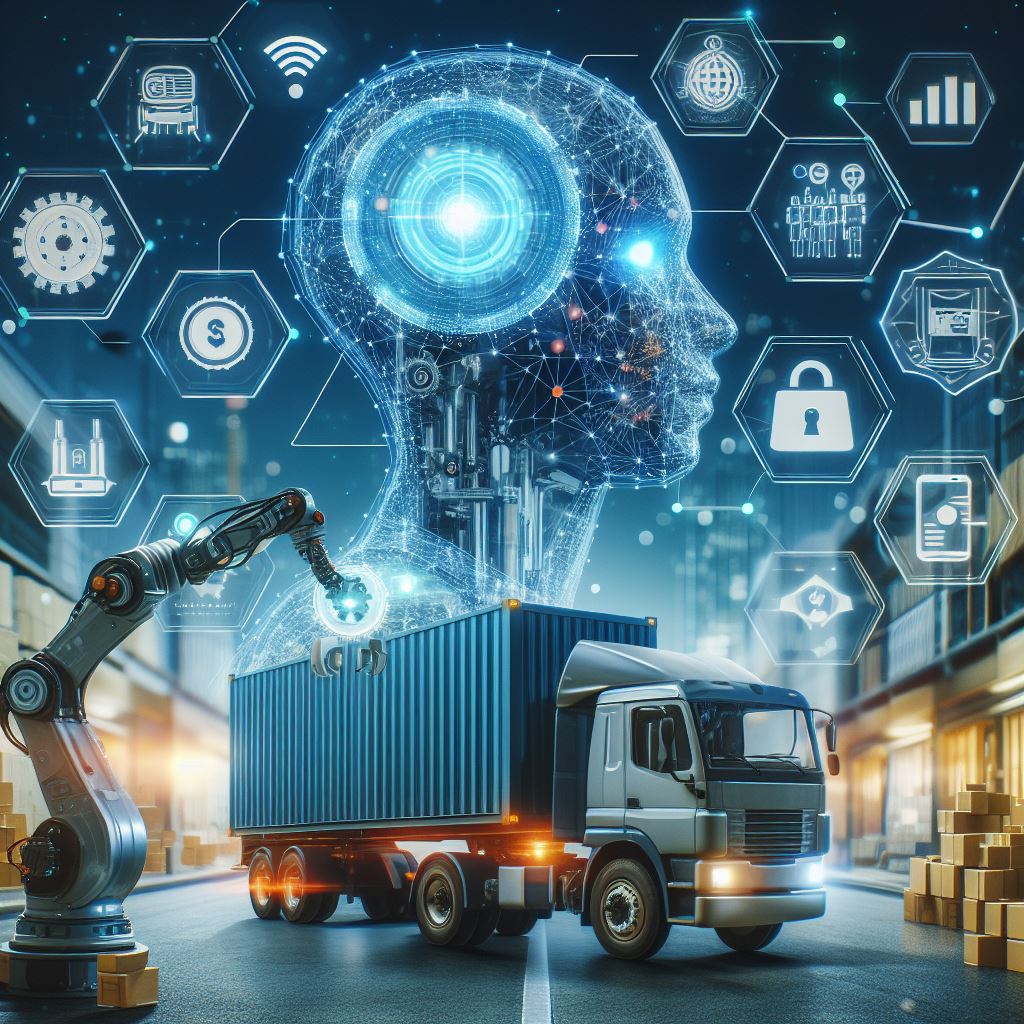The Future of AI in the Logistics Industry
The logistics industry plays a vital role in the smooth flow of goods and services across the globe. From manufacturing plants to store shelves, a product’s journey involves intricate processes and coordination. However, with the integration of AI, these processes are undergoing a remarkable transformation, promising a future where logistics operations are smarter, more efficient, and increasingly responsive to customer demands.
The impact of AI in logistics is profound and measurable. Consider this: businesses that have embraced AI technologies have seen remarkable improvements in their logistics operations. Costs have been slashed by an average of 15%, while inventory management has become 35% more optimized. Looking ahead, the potential of AI in the logistics industry is immense. McKinsey estimates that over the next 20 years, logistics companies stand to generate an astounding $1.3 to $2 trillion annually by leveraging AI technologies.
The Current Landscape of AI in Logistics
As the logistics industry evolves in response to technological advancements, AI is emerging as a powerful force driving efficiency, cost savings, and improved customer experiences. Let’s explore some key areas where AI is making a significant impact on logistics operations:
Predictive Demand Forecasting
AI is revolutionizing inventory management by predicting demand. By analyzing vast amounts of historical sales data, market trends, weather patterns, and even social media sentiment, AI algorithms can anticipate customer demand with remarkable accuracy. This allows businesses to optimize their inventory levels, ensuring they have the right products in the right quantities at the right time. By minimizing stockouts and overstock situations, companies can reduce costs and enhance customer satisfaction.
Route Optimization and Planning
Efficient route planning is crucial for logistics companies to minimize transportation costs and delivery times. AI-powered route optimization algorithms consider a myriad of factors, such as traffic conditions, weather forecasts, vehicle capacities, and delivery priorities, to create the most efficient delivery routes in real-time. By dynamically adjusting routes based on changing conditions, AI helps drivers navigate traffic jams, avoid delays, and optimize fuel consumption. This not only saves time and money but also reduces carbon emissions, contributing to a more sustainable logistics ecosystem.
Warehouse Automation and Robotics
In warehouses and distribution centers, AI-driven robotics are revolutionizing traditional manual processes. Autonomous robots equipped with AI algorithms can navigate warehouse environments, pick and pack orders, and even autonomously transport goods from one location to another. These robots work alongside human workers, augmenting their capabilities and improving overall efficiency. By automating repetitive tasks and minimizing human error, AI-powered robots help warehouses fulfill orders faster, reduce labor costs, and increase throughput.
Enhanced Visibility and Tracking
AI is enhancing visibility and tracking throughout the supply chain, providing real-time insights into the status and location of shipments. Advanced tracking systems equipped with AI algorithms utilize data from GPS devices, sensors, and IoT (Internet of Things) devices to monitor the movement of goods from origin to destination. By analyzing this data in real-time, AI can identify potential bottlenecks, anticipate delivery delays, and proactively address issues before they escalate. This enhanced visibility not only improves operational efficiency but also enables companies to provide accurate delivery ETAs (Estimated Time of Arrival) to customers, enhancing the overall customer experience.
Why is AI Being Used in Logistics?
The integration of AI in the logistics industry offers a plethora of benefits that positively impact various aspects of supply chain management. Let’s delve into some of the key advantages:
Improved Efficiency
AI streamlines and automates many manual processes within the logistics chain, leading to improved efficiency. Tasks such as route optimization, warehouse management, and inventory control can be performed more quickly and accurately with AI algorithms. This efficiency translates into faster delivery times, reduced lead times, and increased productivity across the entire logistics network.
Cost Savings
By optimizing routes, minimizing fuel consumption, reducing labor costs, and preventing stockouts or overstock situations, AI helps companies save money in various areas of their operations. Predictive analytics enable businesses to make smarter decisions regarding inventory levels, procurement, and resource allocation, resulting in significant cost savings over time.
Enhanced Customer Experience
AI enables companies to provide a superior customer experience by offering accurate delivery estimates, real-time shipment tracking, and proactive communication regarding order status. By leveraging AI-driven chatbots and virtual assistants, logistics companies can also improve customer service responsiveness and address inquiries and concerns more efficiently.
Increased Accuracy
AI algorithms can analyze large volumes of data and identify patterns and trends that humans might overlook. This increased accuracy is especially beneficial for tasks such as demand forecasting, inventory optimization, and risk management. By making data-driven decisions, companies can minimize errors and make more informed choices, leading to better outcomes.
Scalability and Flexibility
AI-powered solutions are highly scalable and adaptable to changing business needs and market conditions. Whether it’s scaling up operations during peak seasons or adjusting supply chain strategies in response to disruptions, AI provides the flexibility to handle dynamic environments effectively. This scalability ensures that logistics operations can meet evolving demands and maintain a competitive edge in the market.
Safety and Risk Mitigation
AI technologies, such as predictive analytics and machine learning, can identify potential risks and anticipate issues before they escalate into problems. For example, AI-powered predictive maintenance systems can detect equipment failures before they occur, reducing the risk of downtime and guaranteeing the safety of goods and personnel. Additionally, AI-driven risk management tools can assess factors like weather conditions, geopolitical events, and market trends to proactively mitigate risks and optimize logistics strategies.
The Evolving Future of AI in Logistics
The current landscape of AI in logistics is impressive, but the future holds even more transformative potential. Let’s delve into three emerging technologies that promise to revolutionize how we move goods:
Autonomous Vehicles and Drones
Imagine a world where long-haul trucks navigate highways autonomously, reducing human error and fatigue. Self-driving trucks, equipped with advanced sensors and AI, could optimize routes in real-time, taking into account traffic conditions, weather patterns, and even road closures. This would lead to faster deliveries, reduced transportation costs, and a significant improvement in road safety.
Meanwhile, delivery drones are poised to disrupt the last-mile delivery sector. These unmanned aerial vehicles (UAVs) can efficiently navigate urban landscapes, delivering packages directly to customers’ doorsteps. This technology is particularly suited for congested areas or geographically challenging terrains, offering faster and more flexible delivery options, especially for same-day or express deliveries.
Integrating AI with autonomous vehicles and drones goes beyond navigation. AI can be used for real-time package tracking, ensuring transparency throughout the delivery process. Additionally, AI can analyze weather data and predict potential disruptions, allowing for proactive rerouting to maintain delivery schedules.
Quantum Computing: The Power of Unprecedented Simulation
While traditional computers struggle with complex logistics problems that involve a multitude of variables, quantum computing offers a glimpse into a future with unparalleled processing power. Quantum computers utilize the principles of quantum mechanics to perform calculations that are impossible for classical computers. This opens doors for real-time simulations of entire supply chains, allowing for the optimization of every step, from inventory management to route planning.
Imagine simulating various scenarios – sudden demand spikes, disruptions at ports, or changes in fuel prices. AI, coupled with quantum computing, could analyze these simulations and suggest the most efficient solutions, leading to a more resilient and adaptable supply chain. This level of optimization would cause significant cost savings, improved delivery times, and a more sustainable logistics network.
Blockchain Integration: Building Trust and Transparency
Blockchain technology, known for its secure and transparent data ledger system, has the potential to revolutionize the way we track goods throughout the supply chain. By integrating AI with blockchain, we can create a system that provides real-time insights into the location, condition, and even ownership of goods in transit. This would not only enhance transparency for businesses and customers but also combat issues like counterfeiting and fraud.
AI can analyze data stored on the blockchain to identify potential bottlenecks, delays, or inconsistencies in the supply chain. This real-time visibility allows for proactive intervention and problem-solving, ensuring a smoother flow of goods.
The combination of AI and blockchain also holds promise for streamlining customs clearance and other administrative processes. AI can analyze the data on the blockchain and automatically generate necessary documentation, reducing delays and paperwork burdens.
Enhanced Customer Experience with AI Assistants
Imagine a world where you can track your package in real-time, receive personalized delivery updates, and easily resolve any issues with just a few clicks or voice commands. That’s the future that AI-powered virtual assistants and chatbots are bringing to logistics companies. These intelligent AI assistants leverage natural language processing and machine learning algorithms to understand customer inquiries, provide accurate shipment status updates, and offer proactive support throughout the entire order fulfillment process.
Whether it’s checking the status of a delivery, requesting a change in delivery location, or resolving a delivery issue, AI assistants are there to provide seamless and responsive customer experiences. By delivering personalized and timely assistance, AI assistants enhance customer satisfaction and loyalty, setting logistics companies apart in today’s competitive market.
Self-driving Vehicles
Self-driving vehicles are poised to revolutionize the transportation of goods in the logistics industry. These autonomous vehicles, equipped with AI-powered navigation systems and sensors, can navigate roads safely and efficiently without human intervention. By leveraging real-time data on traffic conditions, weather forecasts, and road hazards, self-driving vehicles optimize delivery routes, minimize fuel consumption, and reduce delivery times.
This not only improves operational efficiency but also enhances safety on the roads. With self-driving vehicles, logistics companies can achieve greater scalability, flexibility, and cost savings in their transportation operations, ultimately delivering goods faster and more reliably to customers.
Damage Detection / Visual Inspection
In the logistics industry, ensuring the quality and condition of goods is paramount. AI-powered damage detection and visual inspection systems enable logistics companies to identify and address potential issues with shipments quickly and accurately. Using advanced image recognition algorithms, these systems analyze images or videos of products to detect any signs of damage, defects, or inconsistencies.
Whether it’s a scratch on a package, a dent in a product, or a missing component, AI-powered visual inspection systems can flag potential issues in real-time, allowing logistics companies to take corrective action before shipments reach customers. By automating the inspection process and improving accuracy, AI-driven visual inspection systems enhance quality control, reduce product returns, and uphold customer satisfaction.
Wrapping Up
AI-powered solutions such as virtual assistants, self-driving vehicles, and visual inspection systems are revolutionizing the way logistics companies operate, enabling them to enhance efficiency, reduce costs, and deliver superior customer experiences. By leveraging predictive analytics, robotics, and blockchain technology, logistics companies can optimize their supply chains, minimize risks, and stay competitive in an increasingly digital and interconnected world.
In the end, the future of AI in the logistics industry is not about machines replacing humans, but rather about humans and machines working together synergistically to create a more efficient, sustainable, and customer-centric logistics ecosystem. With the right strategies and investments, the possibilities are endless, and the future is bright for AI in logistics.
Ready to revolutionize your logistics operations with AI technology? Partner with RTS Labs, your trusted AI consulting firm, to unlock the full potential of AI in your logistics ecosystem.






